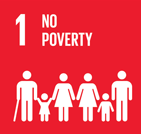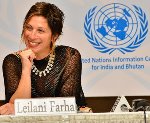Published on Mon, 2017-03-13 21:16
Recent disturbing trends in international finance have particularly problematic implications, especially for developing countries. The recently released United Nations report, World Economic Situation and Prospects 2017 (WESP 2017), is the only recent report of a multilateral inter-governmental organization to recognize these problems, especially as they are relevant to the financing requirements for achieving the Sustainable Development Goals (SDGs). |
Published on Wed, 2017-03-08 00:00
Czech women are two times more likely to fall into poverty than men. This gap is particularly pronounced among the elderly and single-parent families, notes the Czech branch of the Social Watch network in its report published on the occasion of the International Women's Day. In the Czech Republic, women are responsible for 87 per cent of single-parent families, with an estimated total number of 180,000. Nearly 20% of these families with one parent are at risk of poverty. Mothers without a spouse often have low incomes and are twice as likely to be unemployed than the national average. The Social Watch Coalition in Czech Republic launched the report on gender equality concerns itself with two of the most serious issues of today – firstly, the feminization of poverty (the status of single mothers and female pensioners) and secondly, the violence suffered by women and migrants. |
Published on Tue, 2017-03-07 17:43
Czech women are two times more likely to fall into poverty than men. This gap is particularly pronounced among the elderly and single-parent families, notes the Czech branch of the Social Watch network in its report published on the occasion of the International Women's Day. In the Czech Republic, women are responsible for 87 per cent of single-parent families, with an estimated total number of 180,000. Nearly 20% of these families with one parent are at risk of poverty. Mothers without a spouse often have low incomes and are twice as likely to be unemployed than the national average. |
Published on Thu, 2017-03-02 17:52
In the framework of its critical engagement in the 2030 Agenda, ANND launched an effort to document national programs for the implementation of the Sustainable Development Goals (SDGs) and socio-economic reform initiatives in the Arab region. This effort takes the form of national assessment reports and seeks to check if such implementation is made within a comprehensive rights-based development strategy, adopted with an inclusive, participatory and transparent approach. The assessment reports link between monitoring and evaluation by Civil Society Organizations (CSOs) of the implementation of Agenda 2030 and other similar human rights monitoring mechanisms. They shed light on the necessity to adopt an inclusive social dialogue for policy making at the national level. With the limited resources available, the reports shall be made on a few countries (namely Jordan, Egypt and Morocco) and shall focus on 3 SDGs only: |
Published on Thu, 2017-03-02 15:18
The ‘financialization of housing' is one of the greatest challenges to the right to adequate housing, with housing now being valued as a commodity rather than a human dwelling, a United Nations rights expert has charged. This admonishment came in the latest report by the UN Special Rapporteur on the right to adequate housing, Ms Leilani Farha (from Canada), which was presented to the Human Rights Council on Wednesday. The Human Rights Council is currently holding its thirty-fourth regular session here from 27 February to 24 March. |
SUSCRIBE TO OUR NEWSLETTER







